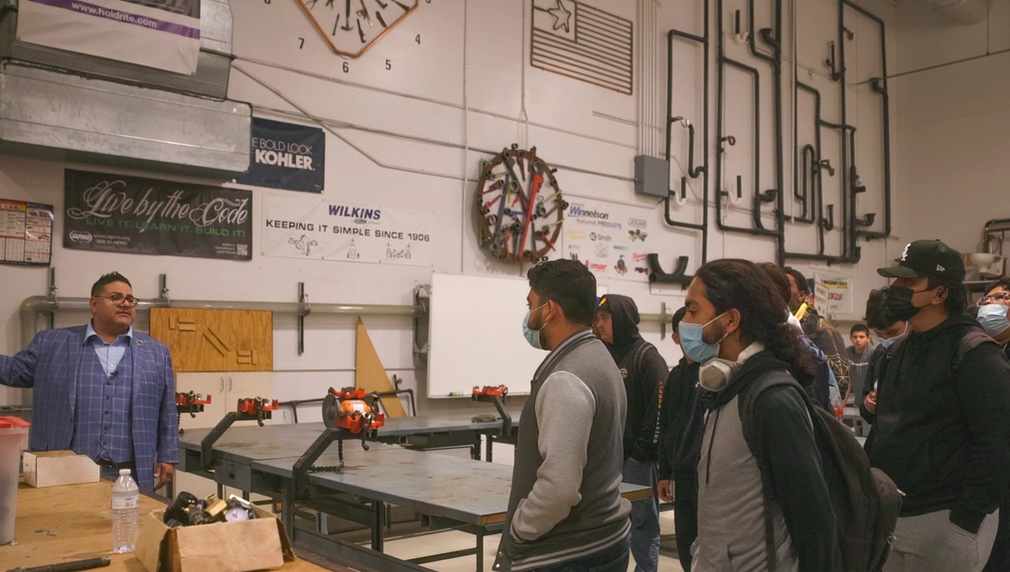Help Continuation School Students Get Good Jobs
Continuation high schools represent the last chance for students who have fallen behind to complete high school in a school setting. Sharefest is unique among community-based organizations, having worked in these under-resourced schools since 2009 to build extra-curricular programming embedded within them. In 2021, we launched a Workforce Development Program to prepare and place students into well-paying careers that do not require a college degree, such as oil refining, construction, healthcare and IT.

What is the primary issue area that your application will impact?
Youth Economic Advancement (sponsored by Funding Partner, TBA)
In which areas of Los Angeles will you be directly working?
South LA
South Bay
In what stage of innovation is this project, program, or initiative?
Pilot or new project, program, or initiative
What is your understanding of the issue that you are seeking to address?
In the Los Angeles Unified School District (LAUSD), Continuation High Schools are “small campuses offering instruction to students between the ages of 16-19 who are deemed at risk of not completing their education.” They are an under-resourced and under-served part of the LAUSD that are home to youth who are at greatest risk of dropout. Sharefest began service to these schools in 2009 and is the only community-based organization embedded in five schools in South LA/Harbor areas that are rife with violence and poverty. While college offers a pathway to a better life, it is a daunting challenge for students struggling to complete high school. They want another way to achieve economic security. At the same time, local companies – including Sharefest’s corporate partners – have trouble filling well-paying, career path jobs that do not require a college degree. Therefore, we launched our Workforce Development program in 2021.
Describe the project, program, or initiative this grant will support to address the issue.
Sharefest’s Youth Leadership Academy (YLA) serves students in five Continuation High Schools in the South LA and Harbor areas of Los Angeles: Avalon (Wilmington), Angel's Gate (San Pedro), Patton (Harbor City), Simon Rodia (Watts/South Gate), and Moneta (Gardena). Working under an agreement with the LAUSD (that does not include funding), the YLA delivers a comprehensive, credit-eligible College and Career Development course at the school site that encompasses foundational personal growth work in Socio-Emotional Learning, Purpose Education, Professional Development, College/Career Access, Entrepreneurship, Financial Literacy and Service Learning. The weekly course has four semester-long units designed to build on each other and go deeper with each unit. YLA Instructors serve as Mentors, with group mentoring built into the class time and 1-on-1 mentoring on a weekly basis. The YLA also has a full-time Case Manager to assist students, train staff, and guide program development so that services are trauma-informed and support student mental health. In the Workforce Development Program’s inaugural year, we infused the YLA curriculum with exercises to help students develop a career plan, panel discussions and field trips to expose students to potential career opportunities, and a 4-week summer post-graduate “launch” program. In 2022-23, we will build the capacity to place students into internships, apprenticeships and other entry-level, career-path positions.
Describe how Los Angeles County will be different if your work is successful.
If we are successful: 1) Continuation school students will feel confident there is a path for them to achieve a prosperous future. By the time they enter a continuation school, many students feel demoralized and “beaten” by the educational system. The YLA – and Workforce Development Program, in particular – will help them overcome feelings of “failure” and envision a future in which they are a valued and an important part of the community. 2) Local businesses that are in need of skilled workers will have a new pipeline of entry-level employees with the foundational training necessary to be effective, long-term assets to the corporation. L.A. County will experience a financial boost. Helping students at high risk of dropout to complete high school and find a path to economic security will alleviate the $392,000 each high school dropout costs the state of California (California Dropout Research Project, 2007) while providing local companies the workforce they need to thrive.
What evidence do you have that this project, program, or initiative is or will be successful, and how will you define and measure success?
Our goal is to achieve the objectives developed by the US Partnership on Mobility from Poverty (www.mobilitypartnership.org), a framework that goes beyond traditional measures of Economic Success to include “Power and Autonomy” and “Being Valued in the Community” as keys to helping disadvantaged populations achieve true social equity and inclusion. We assess progress toward our Economic Success goals by tracking graduation, Grade Point Average and college matriculation and persistence. Within a year, we will add job placement to our metrics. Measurements of increased “Power and Autonomy” and “Being Valued in the Community” are accomplished with the Measuring Mobility Toolkit's evaluation instruments, which include validated pre-post questionnaires. A full-time staff Program Evaluator enters all data into an Apricot 360 tracking database. These data are complemented with feedback from teachers, counselors, and school administrators, along with close engagement with our students.
Approximately how many people will be impacted by this project, program, or initiative?
Direct Impact: 350
Indirect Impact: NaN